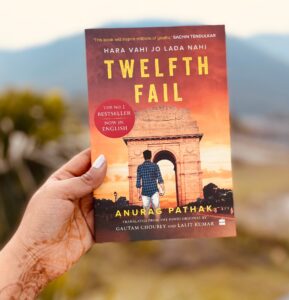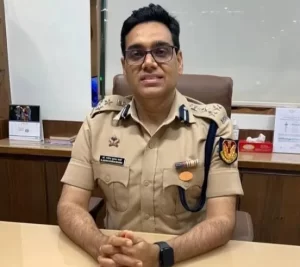
‘12th Fail: Hara Wahi Jo Lada Nahi’ is the biography of Manoj Kumar Sharma, who could not manage to clear his 12th standard exam yet cleared the Civil Services examination, one of the toughest exams in India and is serving as an IPS officer today. By bringing to light various facets of Manoj’s journey to civil services, the author, Anurag Pathak, draws a considerably real picture of struggles of villagers and economically underprivileged sections of society. The story simultaneously draws upon the weaknesses of our system. From struggle for survival to lacunas of Indian executive systems to mingling of romance and education, several interesting dimensions of the text will be reviewed here.
Amongst very interesting portrayals in the text is the description of the system of copying in exams prevalent in Manoj’s village and is actually a problem in other places too even today. It has been honestly presented that the protagonist of the plot could qualify the 10th exam by cheating. Designated schools in Manoj’s village where teachers wrote answers on blackboards to be copied by examinees have been mentioned, in one of which Manoj enrolled. Due to the visit of a police officer that year, cheating was not possible and Manoj failed his exam.
Another aspect that would touch the core of anyone’s heart was the story of Manoj’s struggle for food and his self-respect under the circumstances. Manoj, living away from his home for studies, found himself homeless due to conflicts with his relative’s roommate. Struggling with hunger and having no money, he approached a hotel seeking work in exchange for food. Despite the owner’s insistence on free meals, Manoj chose to preserve his self-respect by washing utensils in return for sustenance. It is an instance which carries the message of paying for any obligation no matter what the situation.
Another beautiful episode is the apt description of experiences of a villager with weak English in a class of city dwellers whom the villager views superior to him. Pathak has accurately put to words the emotions of Manoj with whom nobody was interested to interact. However, after Manoj was the only one who answered a question by the professor and the professor praised him, all were keen to talk to him.
Yet another realistic representation in the text is of dwindling views that a person can form about others. Manoj’s view of his friend, referred to by him as ‘Panday’, change from a helping friend at times of distress to a city-dweller who cannot identify with villagers to a jealous person of his success to a final confession of him as a person with differences of points of view yet a saviour at odd times. It also illustrates the change of behaviour of people with changing situations as did Panday’s behaviour. When Manoj was in need, he provided him with accommodation , but his own consecutive failed attempts stirred in him a sense of envy. The final point of interest is the portrayal of challenges which are faced in maintaining a relationship and academic preparation simultaneously and how these can be met with. Manoj had to often listen to sarcastic comments due to his love for Shraddha, a fellow in his coaching institute. It is exemplary how Manoj determined to prepare hard to prove those people wrong who were of the opinion that preparation and forging relations could not work together. Instead of deviating from actual life goals, Manoj and Shraddha assisted each other and prepared to the best of their abilities. It should be a guide to those who seek to involve themselves in a relationship for the sake of competing with their fellows and cannot decide their approach in the relationship.

Other than the above references, there are additional aspects that engage the reader such as Manoj reading ‘Tourism in India’ as ‘Terrorism in India’ in the Mains examination and losing an attempt or the instance where he makes dogs walk to earn money for sustaining his stay in Delhi or his spontaneous decision to become a Police officer after meeting an honest officer.
’12th Fail: Hara Wahi Jo Lada Nahi’ provides a compelling look into Manoj Kumar Sharma’s rise from academic challenges to success in the Civil Services exam. Anurag Pathak skillfully delves into issues within the education system and explores the dynamics of relationships in one’s life, both familial and romantic. Overall, it’s a captivating and thought-provoking read.

